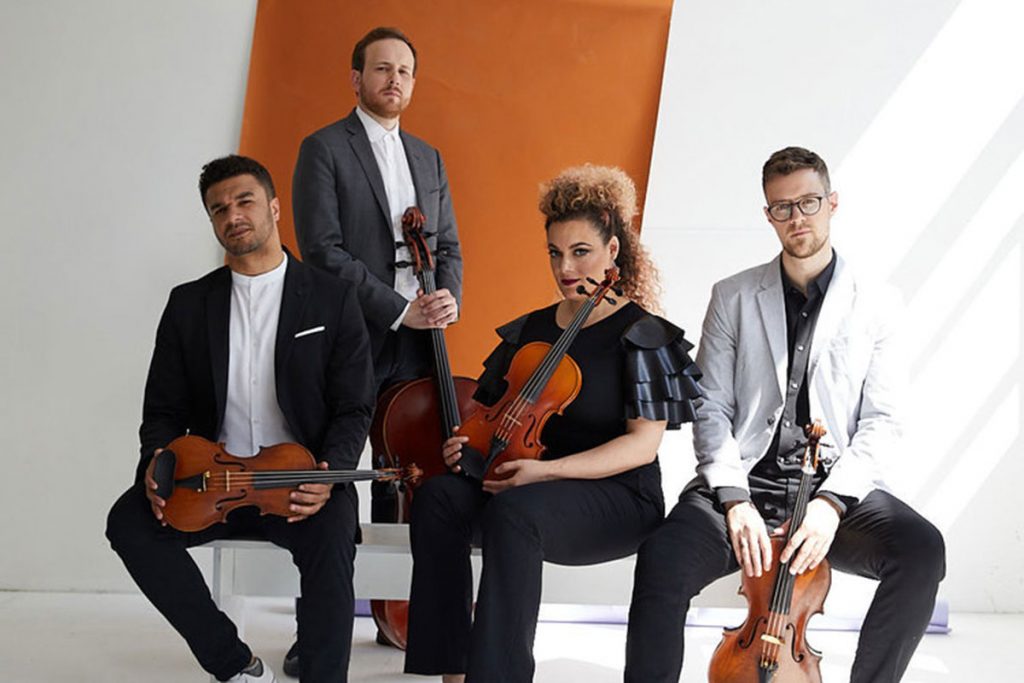
As beautiful as Beethoven’s music is, violist Nick Revel has never been able to find himself in the notes.
“I will never feel a personal connection while performing Beethoven’s music,” Revel said. “He had his set of ideas and his set of feelings, and the most we can do is relate to them. Playing music that is our creation gets rid of that barrier. We are no longer relating to it — we are it.”
As a part of the world-renowned PUBLIQuartet, Revel, joined by violinist Curtis Stewart, violinist Jannina Norpoth and cellist Hamilton Berry, has dedicated his career to presenting new works for string quartet, breaking the mold for “accepted string repertoire.”
“I have learned, and learned to love, that the only rules in place are made up, they are fabrications that have been acquired,” he said. “It feels really freeing to be able to play music beyond that. It’s my own personal statement.”
The PUBLIQuartet rose in the music scene after winning the 2013 Concert Artists Guild’s New Music/New Places award. In 2019, they garnered Chamber Music America’s prestigious Visionary Award for outstanding and innovative approaches to contemporary classical, jazz and world chamber music. The quartet will perform their program “Freedom and Faith” at 4 p.m. EDT Monday, Aug. 10, on the CHQ Assembly Video Platform.
We have been picking these composers based on who has been kicking ass, going against the grain and not taking ‘no’ for an answer,” Revel said.
PUBLIQuartet’s genre-bending programs range from 20th-century masterworks to newly commissioned pieces, alongside re-imaginations of classical works featuring open-form improvisations that expand the techniques and aesthetic of the traditional string quartet.
“It’s really effective as a program to make a concept and to have a line through all of the pieces that bring them together,” Revel said. “Sometimes it’s literal storytelling and sometimes it’s just references to certain eras or genres in history. Both bring meaning to an audience.”
“Freedom and Faith” highlights works written by female composers whose music represents “resilience, resistance, and subversion,” including Jessie Montgomery’s 2008 “Voodoo Dolls,” Jessica Meyer’s 2017 “Get into the Now” and two PUBLIQuartet compositions including their 2017 “Sancta Femina” and 2018 “Nina!”
“We have been picking these composers based on who has been kicking ass, going against the grain and not taking ‘no’ for an answer,” Revel said.
Montgomery is a founding member of the PUBLIQuartet and Revel said her 2008 “Voodoo Dolls” has been a “staple” in their sets for more than 10 years. The piece was commissioned and choreographed by the JUMP! Dance Company in Rhode Island — the choreography is a suite of dances, each one representing a different traditional children’s doll: marionettes, Russian dolls, rag dolls, Barbie dolls and voodoo dolls. The piece is influenced by west African drumming patterns and lyrical chant motives, all of which feature highlights of improvisation within the ensemble.
“We literally play it from memory,” he said. “When we put the music out for it, it’s almost distracting.”
Meyer dedicated her 2017 “Get into the NOW” to the PUBLIQuartet. According to Stewart, the piece was inspired by the rhythms of funk, tango and bluegrass music, in addition to the expressive ways of playing that are “inherent to each of these genres.”
“Her music is very groove- and loop-oriented,” Stewart said. “Jess uses extended techniques to emulate electronics and to expand the feeling a string quartet can create. She filled this work with moments that allow all of us to put our own personal twist on it.”
“Nina!” and “Sancta Femina” are both part of PUBLIQuartet’s “MIND THE GAP” series in which the quartet takes music of different styles, genres and eras and “reimagines” them with group improvisation and composition.
“Nina!” honors Nina Simone, a Black musician who aspired to be a concert pianist. In 1950, she enrolled in the Juilliard School of Music in New York City before applying for a scholarship to study at the Curtis Institute of Music in Philadelphia, where she was denied admission despite a well-received audition. Stewart said she attributed the rejection to racial discrimination.
In 1963, Simone’s solo debut at Carnegie Hall took place the same day Martin Luther King Jr. was arrested and jailed with a group of protestors in Birmingham — and 1963 was the year Simone began to craft protest songs in earnest, spurred by the March on Washington for civil rights, and persistent violence against Black citizens in the South.
Growing up, I always had to wonder if my musical feelings were valid, but when I hear someone play the blues on a string instrument I feel a way that is more than, ‘Oh, that’s beautiful,’” Stewart said. “It’s also, ‘Wow, I am beautiful, and I am powerful, and I am worth being on that stage.’”
Stewart said Simone’s only regret about her Carnegie Hall performance was she was “billed as a jazz singer” instead of a classical musician. PUBLIQuartet made it their mission to honor both sides.
“We really connected with her as an artist, as she was using the techniques of both a jazz and classical idiom and was making money while doing it,” he said. “Let’s be real, a ton of people were doing it, but those you hear about, you hear about for a reason. Artistically, Nina is a hero of this music.”
Revel can’t find himself in Beethoven’s notes; he can only relate to them. But Stewart, a Black musician, finds himself in both the image of Simone and the sounds of her strains. It’s a “lofty goal, that reimagining,” but they strive for it in every composition, not only for themselves, but for the next generation of string players.
“Growing up, I always had to wonder if my musical feelings were valid, but when I hear someone play the blues on a string instrument I feel a way that is more than, ‘Oh, that’s beautiful,’” Stewart said. “It’s also, ‘Wow, I am beautiful, and I am powerful, and I am worth being on that stage.’”
This series is made possible by Bruce W. and Sarah Hagen McWilliams.




